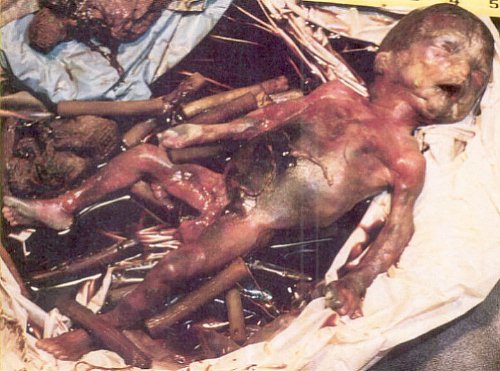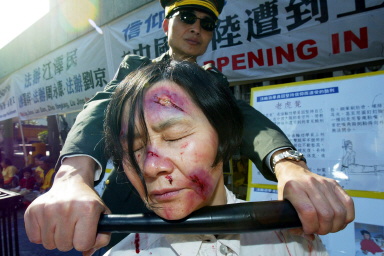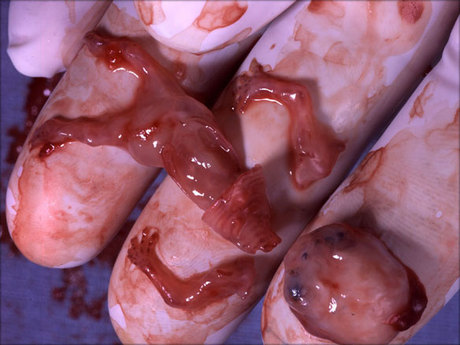China admits women were forced to have abortions
By David Eimer in Beijing
Published: 21 September 2005
 Several
health workers have been arrested in
Shandong Province in the east of China after
the authorities admitted that local
officials had been forcing women to have
abortions or undergo sterilisations.
Several
health workers have been arrested in
Shandong Province in the east of China after
the authorities admitted that local
officials had been forcing women to have
abortions or undergo sterilisations.
Sources in Linyi City and its surrounding counties claimed that up to 120,000 women had been coerced into submitting to the procedures and that some of them were in the ninth month of their pregnancies.
The arrests follow the detention on 6 September of a local activist, Chen Guangcheng. Mr Chen had claimed that women with two children were being forced to undergo sterilisations, while women pregnant with their third child were required to have abortions.
Human rights groups have long insisted that China used compulsory abortions and sterilisations as a way of enforcing its one-child policy, which restricts couples to just one child and was introduced in 1979 as a means of controlling the growth of its population.
Yu Xuejun, China's National Population and Family Planning Commission (NPFPC) spokesman, admitted it had received "successive complaints" about the activities of its officials in Linyi. "Some persons in a few counties and townships of Linyi did commit practices that violated laws and infringed upon the legitimate rights and interests of citizens while conducting family planning work," said Mr Yu on the NPFPC website. "The responsible persons have been removed from their posts and some have been detained."
Growing public disquiet over the activities of health workers in Linyi prompted 34 year-old Mr Chen to get involved in March this year, after locals complained that people who defied the sterilisation orders were being imprisoned and that, if they fled, members of their family were held until they returned and submitted to the procedures.
One 24-year-old women described how she was taken to Feixian hospital in one of Linyi's surrounding counties in February when nine months pregnant and had an unknown liquid injected into her uterus, forcing a miscarriage and killing her baby. She already had a son and was told her second pregnancy violated family planning limits.
Mr Chen filed a lawsuit accusing Linyi officials of breaching family planning laws but, soon after arriving in Beijing earlier this month to meet with lawyers sympathetic to his case, he was arrested and held for 30 hours. He is now under house arrest and is believed to have gone on hunger strike over his treatment.
Forced abortions and compulsory sterilisations were commonplace in the early 1980s in China, which with 1.3 billion people is the world's most populous nation. But since the mid-1990s, the government has supposedly switched to a system of fines for couples who have more than one child, while offering annual pensions of about £85 to couples over 60 who have adhered to the one-child policy.
Beijing insists local officials are not authorised to compel people to undergo abortions or sterilisations. Mr Yu said NPFPC officials have travelled to the region to "correct any infringements of citizens rights".
Mr Chen's campaign is the latest example of how ordinary Chinese are becoming increasingly vocal about government abuses and are eager to take advantage of what legal rights are on offer to them. In response, the authorities have adopted a policy of blaming local officials. But all local government workers have to meet performance targets laid down by Beijing.
The government claims the one-child policy has restricted the population by more than 300 million. But the traditional Chinese preference for boys over girls has resulted in selective abortions that has led to a severe shortage of women.
But Zhang Weiqing, the minister for the NPFPC, said last week that "China's low birth rate is unstable" and insisted that family planning policy would stay the same.
 CHINA—Recently, governments in Shandong and
Guangxi Provinces are forcing pregnant women to abort their babies.
Among these pregnant women, some of them are in the late stages of their
pregnancy.
CHINA—Recently, governments in Shandong and
Guangxi Provinces are forcing pregnant women to abort their babies.
Among these pregnant women, some of them are in the late stages of their
pregnancy.
 Our reported called the Youjiang People's
Hospital on the April 18 to inquire about Wei and He's situation.
Our reported called the Youjiang People's
Hospital on the April 18 to inquire about Wei and He's situation. 